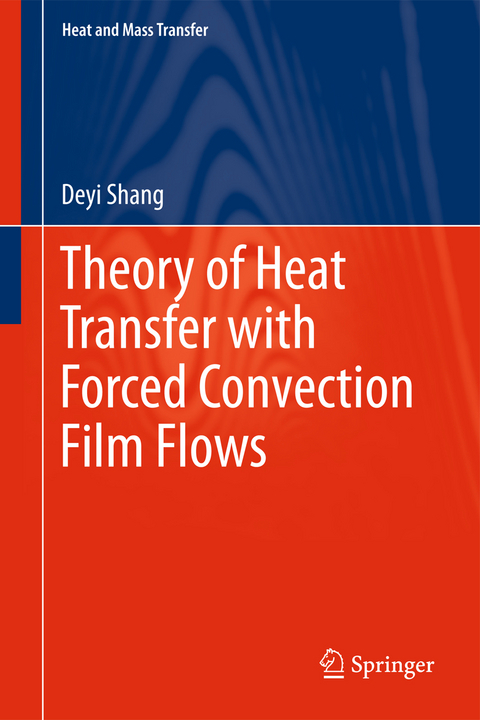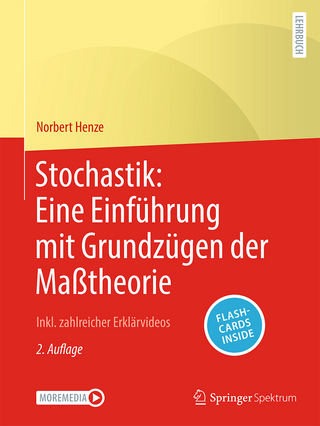
Theory of Heat Transfer with Forced Convection Film Flows
Springer Berlin (Verlag)
978-3-642-26623-2 (ISBN)
Developing a new treatment of 'Free Convection Film Flows and Heat Transfer' began in Shang's first monograph and is continued in this monograph. The current book displays the recent developments of laminar forced convection and forced film condensation. It is aimed at revealing the true features of heat and mass transfer with forced convection film flows to model the deposition of thin layers. The novel mathematical similarity theory model is developed to simulate temperature- and concentration- dependent physical processes. The following topics are covered in this book: 1. Mathematical methods- advanced similarity analysis method to replace the traditional Falkner-Skan type transformation- a novel system of similarity analysis and transformation models to overcome the difficult issues of forced convection and forced film flows- heat and mass transfer equations based on the advanced similarity analysis models and equations formulated with rigorous key numerical solutions2. Modeling the influence of physical factors- effect of thermal dissipation on forced convection heat transfer- a system of models of temperature and concentration-dependent variable physical properties based on the advanced temperature-parameter model and rigorous analysis model on vapor-gas mixture physical properties for the rigorous and convenient description of the governing differential equations- an available approach to satisfy interfacial matching conditions for rigorous and reliable solutions- a system of numerical results on velocity, temperature and concentration fields, as well as, key solutions on heat and mass transfer - the effect of non-condensable gas on heat and mass transfer for forced film condensation.This way it is realized to conveniently and reliably predict heat and mass transfer for convection and film flows and to resolve a series of current difficult issues of heat and mass transfer with forced convection film flows. Professionals in this fields aswell as graduate students will find this a valuable book for their work.
Introduction.- Basic conservation equations for laminar forced convection.- Falkner-Skan type transformation for laminar forced convection.- New similarity analysis and transformation method for laminar forced convection.- Heat transfer on laminar forced convection without consideration of viscous thermal dissipation.- Heat transfer on laminar forced convection with consideration of viscous thermal dissipation.- Heat transfer on laminar forced convection with consideration of variable thermophysical properties.- Complete similarity mathematical models on laminar forced film condensation of pure vapor.- Velocity and temperature fields on laminar forced film condensation of pure vapor.- Heat and mass transfer on laminar forced film condensation of pure vapor.- Complete similarity mathematical models on laminar forced film condensation of vapor-gas mixture.- Velocity and temperature fields on laminar forced film condensation of vapor-gas mixture.- Heat and mass transfer on laminar forced film condensation of vapor-gas mixture
| Erscheint lt. Verlag | 30.1.2013 |
|---|---|
| Reihe/Serie | Heat and Mass Transfer |
| Zusatzinfo | XXII, 346 p. |
| Verlagsort | Berlin |
| Sprache | englisch |
| Maße | 155 x 235 mm |
| Gewicht | 563 g |
| Themenwelt | Mathematik / Informatik ► Mathematik ► Wahrscheinlichkeit / Kombinatorik |
| Naturwissenschaften ► Physik / Astronomie ► Mechanik | |
| Naturwissenschaften ► Physik / Astronomie ► Strömungsmechanik | |
| Naturwissenschaften ► Physik / Astronomie ► Thermodynamik | |
| Technik ► Elektrotechnik / Energietechnik | |
| Technik ► Maschinenbau | |
| Schlagworte | Concentration-dependent properties • fluid- and aerodynamics • Forced convection and film flows • Forced film condensation • Novel similarity theory • Temperature-dependent properties • Theory of heat and mass transfer |
| ISBN-10 | 3-642-26623-1 / 3642266231 |
| ISBN-13 | 978-3-642-26623-2 / 9783642266232 |
| Zustand | Neuware |
| Haben Sie eine Frage zum Produkt? |
aus dem Bereich


